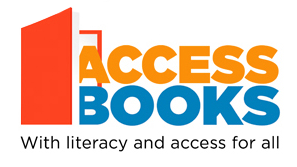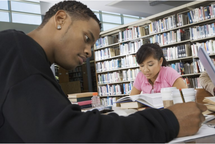|
Marilyn is a gregarious, loquacious, and active 4th grader at a school in south Los Angeles nestled near the 110 freeway in a highly industrial section of the city. Marilyn lives in a converted garage with her mother, father, three year old sister, and one year old brother. The family shares one room that serves as a kitchen, dining room, living room, and bedroom. There are no parks or bookstores near her home. The closest public library and grocery store are accessible only by bus. Marilyn’s family owns no books. “I love books but I don’t have any. Sometimes, the teacher lets me take a book home from her classroom. I feel really special. I really love to read. I love the feeling it gives me I just don’t have much to read,” Marilyn explains. She attends a school at which the library has been long neglected with outdated titles and a tattered selection. Some books are over 60 years old. Marilyn had never visited the public library. “We found out about it at school but it is so far away and we just don’t go,” she said. The closest bookstore from her home is a solid 90 minute bus ride. Surprisingly, when asked, Marilyn did not even know bookstores exist. “You mean that’s all they sell? You could buy some?” she inquired. Clearly, she’s never visited a bookstore. What is the result when Marilyn has access to high-interest books at a well-stocked school library? On a Saturday in the spring, a group spent the day refurbishing the library with new paint, comfortable furniture, and more importantly, new, high interest books. This had a profound effect on Marilyn, her school culture, and her family. School: An excitement around the library was immediately created. As the principal said, “there was a buzz about books.” Teachers felt more confident about reading instruction because there were actually books kids could read. “It’s great to tell kids to read but when there is nothing to read, you feel bad and insincere,” said one teacher. As the principal added, “a library on the campus completely shifted the school. Reading, books and reading books for fun became the focus. Children see that books are not for taking tests. Books are for life. When you don’t have good books, you don’t read. Children felt valued when they got the library.” Marilyn: While Marilyn liked reading before the library refurbishment, her interest was amped up when a new library was installed. She stated “when you have old books, you don’t want to read and a little bit you don’t feel like it is important. When you have new books, you want to read. I could not believe all these people came to my school so I could have a library. It made me feel so great. I just love the place. I would give up pizza before giving up going to the library.” Marilyn and her friends often visit the library after school and wish they could hang out there during recess. Marilyn claims that the library has transformed her. “I read a Rick Riordan book but then we got the whole set in the library. I read them all and got my friends to read them. Now, my friends and I like to talk about what we read. I am so in love with Rick Riordan. Sometimes, walking down the street, I think of stuff from his stories. I see Rick Riordan everywhere. It changed my life. I liked to read but now I know I am really a reader. I did not know I am a reader until we got the books and the library,” she eagerly reported. Marilyn’s teacher reports that she is a more confident writer and reader in class. She is eager to share her knowledge about what she reads. “The light bulb went on. The kid is in love with reading. I never see her without a book,” the teacher reported. Family: Perhaps one of the most profound effects the school library had on Marilyn occurred in the one room apartment above a garage. Marilyn brought home books that she wanted to read but she also brought some to read to her siblings. Her mother listened during the read alouds. Soon, Marilyn was reading daily to her mother and siblings. They started with picture books and quickly progressed. It is now part of the family routine. “One of the greatest things is my mom and I both love Harry Potter. When we are just around- at the market or doing laundry, we talk about the stories. We have so much fun. My mom likes it when I add to the stories. I really make her laugh. She told me when she is at work, she thinks about our stories,” Marilyn eagerly says. Marilyn’s mom has made it her goal to become a proficient enough reader to read Harry Potter to her younger children. Marilyn’s story is one of many that show a school library has profound effects on children. While we can measure the effects on their test scores, it is more difficult to measure the meaningful, long term effects. How do we measure a parent’s new interest in reading to children? How do we measure a child’s obsession with Rick Riordan stories? How do we measure what kind of reader her younger siblings will become? We can’t. However, we can fund school libraries. Rebecca Constantino, PhD, is the founder & executive director of Access Books, a non-profit that refurbishes inner city school libraries. She has published over 100 articles and a book in the areas of literacy development, equity in education, urban school and cultural perspectives of language acquisition and reading courses at UC Irvine, UCLA, and Pepperdine University. Her favorite children’s book is Caps for Sale. She read it daily for years to one of her three children.
0 Comments
Leave a Reply. |
PressArchives
December 2022
Categories |
We are a registered 501(3)c. Tax ID 31-1655018
Copyright © 2023 Access Books. All Rights Reserved.
Copyright © 2023 Access Books. All Rights Reserved.


 RSS Feed
RSS Feed
